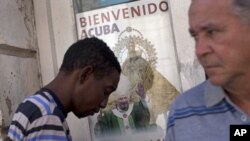Pope Benedict XVI arrives in Cuba Monday. His first stop will be near the eastern city of Santiago to mark the 400th anniversary of a religious icon there. The Virgin of Charity of El Cobre is venerated by many Cubans, regardless of their faith. But it is central to the Roman Catholic Church's strategy for a country where religious restrictions recently have been easing.
A constant stream of pilgrims dressed in bright yellow bring sunflowers and other offerings in the color associated with the Our Lady of Charity. Four hundred years ago, the statue was found at sea. And legend has it that her rescue calmed the stormy waters.
The cathedral that houses the icon was built just outside Santiago in the 1920s. A collection of world championship sports medals and baseball jerseys attests to the credit she gets for spurring her devotees on to great achievements. Even Ernest Hemingway offered her his 1954 Nobel Prize in Literature.
After lighting a few yellow candles, Jeanette Galdeano says the Virgin of Charity helps her have faith. “I pray for peace, for my family, my children and all Cubans. And I'm thinking about the hope that every day things will get better and we can move forward,” she says.
Few Cubans attend church regularly. Many more blend Catholic saint veneration with voodoo and other traditions that came to Cuba from Africa hundreds of years ago.
The Rev. Dionisio García Ibáñez is the archbishop of Santiago. He says the pope is aware that the 400-year-old national patron is a symbol for non-Catholics as well. “The pope chose to come at this time to celebrate the jubilee year. And there's not even the slightest doubt that he understands the spiritual reality of our people,” the archbishop says.
The Vatican hopes that the pope's visit to the shrine will help revive faith in Cuba. A glimpse of the future of Catholicism can be seen at the Sagrada Familia Church in Santiago. Every Saturday, dozens of children receive catechism from a small group of parents and former students.
University student Virgen Angelica Ladron de Guevarra is one of the teachers. She says Catholic faith is growing in Cuba. “And with this pope's visit, I think that both the government and nonbelievers are beginning to show a little more trust in Catholics and in the Church,” she says.
The Roman Catholic Church is the only institution with authority that is not part of the communist system here. Many Cubans are grateful for its efforts to advance economic liberalization.
Rev. Luis del Castillo came to help the Cuban church after retiring from his bishop's duties in his native Uruguay. He says secularism does not have deep roots in Cuba, as it does in some countries in Eastern Europe and Latin America that emerged from communist or authoritarian rule.
“We're stepping on a very fertile ground, because the people here are very religious, more than in my own country in Uruguay,” Castillo says. “And I think this good turf will help, that the seeds of the Gospel will give good fruit in the future.”
As they head out into the almost blinding light of Santiago, the children pass a poster welcoming Pope Benedict. He, too, apparently is hoping that these children will help revive Catholicism in a country that was once an atheist state.




